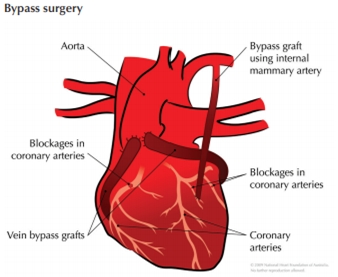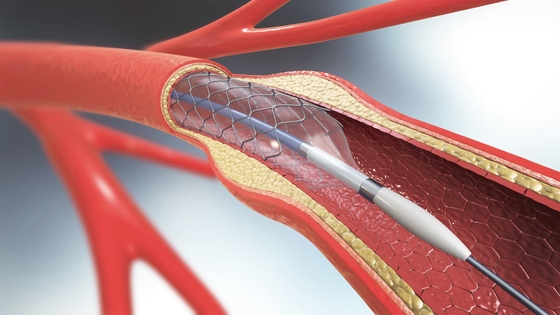
Heart bypass surgery
Key takeaways
5 min read
- Heart bypass surgery, or CABG, improves blood flow to the heart in people who have blocked or narrowed blood vessels.
- Heart bypass surgery is performed if you have symptoms of coronary heart disease and are not a candidate for a coronary angioplasty or a stent procedure.
- There are important things you can do to prepare for your heart bypass surgery and to speed up your recovery after the operation.
What is a heart bypass surgery?
Heart bypass surgery uses replacement blood vessels to make a new path for blood to move around blockages. It is sometimes called different names including coronary artery bypass graft surgery (CABG), cardiac bypass surgery, or cardiac revascularisation.

Why do people need heart bypass surgery?
You may need bypass surgery if one or more of your heart’s arteries have become too narrow or blocked and not enough blood can reach your heart muscle. The reduction in blood flow to your heart muscle can cause chest pain (angina) that does not get better with medicines or a heart attack. You may hear these being referred to as types of acute coronary syndromes (ACS).
These blockages can be a result of coronary heart disease, where fatty plaques build up in your arteries.
Bypass surgery will improve blood flow to your heart muscle, reduce your symptoms of coronary heart disease and protect your heart muscle from further damage.
Not everyone with coronary heart disease will need a heart bypass, some people are treated with coronary angioplasty or a stent procedure. A heart bypass may be performed if you have coronary heart disease but are not suitable for alternative treatments.
How is heart bypass surgery done?
Heart bypass surgery is performed in a hospital under a general anaesthetic. On the day of the surgery:
- In-hospital preparation – you will change into a hospital gown and asked to lie down on a hospital bed. Medical staff may attach some leads to the skin on your chest and to your finger to monitor your heart and oxygen levels.
- Anaesthetic – the surgery is done under a general anaesthetic, which means you will be asleep while it is happening. Small needles will be put into your hand and/or arm. You may be given some medicine to help you relax before you are given the general anaesthetic.
- Accessing your heart – to reach your heart, the surgeons will cut along the middle of your chest, through your breastbone. Sometimes, the operation can be done through a smaller cut in your chest. This will depend on how many narrowings you have in your heart’s arteries, and where they are.
- Getting new vessels – arteries or veins will be removed from your arm, thigh, lower leg or chest. The surgeon will only remove arteries in areas that have another source of blood flow.
- Attaching the new vessels – the new vessels will be attached above and below the blockage to bypass the narrowed or blocked heart arteries. This allows the blood to flow more easily to the heart as there is now a ‘detour’ past the blockage. While these vessels are being attached, your heart will be stopped for a short time. When this happens, you will be connected to a heart-lung machine which will temporarily take over from your own heart and lungs and pump blood to the rest of your body.
- Finishing – to finish the bypass, the surgeons will use wire or strips of special tape to hold your breastbone together. These don’t need to be removed, but it will take about six to 12 weeks for your breastbone to heal completely.
Heart bypass surgery usually takes between three and four hours.
How to prepare for heart bypass surgery
If your surgery is booked in advance and isn’t an emergency procedure, you’ll usually have several appointments before the operation. This is when you’ll be asked about your health and family medical history and given information about how to prepare for your surgery. These appointments are important times to ask questions and understand your surgery, how to prepare for surgery, and what to expect afterwards. Bringing a family member or a support person to these appointments is often a good idea so they can help you understand the process and provide you with support. It can also be useful to write down a list of questions before your appointments to help you remember everything you wanted to ask.
You may need to attend an information session where you’ll find out more about bypass surgery and how to plan for it.
Before the operation
- Around two weeks before your surgery, you’ll need to:
- Check with your doctor about your medicines – you may need to stop taking some of them before the surgery.
- Have some important tests – these include an ECG, chest X-ray, blood tests, nose and groin swabs, and carotid doppler (an ultrasound of the blood vessels in your neck that supply the brain).
- Shower with antibacterial soap – your doctor will recommend one for you.
- Get your home ready for when you return from hospital.
- Plan your transport home – you will need to find someone who can collect you from the hospital and help you get home after surgery.
- Arrange for someone to help with shopping, meals, cleaning and driving after you leave hospital.
On the day before surgery
- Ensure you have organised your home or any commitments while in hospital for up to a week.
- Pack a small bag of essentials, such as toiletries, glasses, and light pyjamas or clothing.
- Stop eating and drinking from midnight on the night before your surgery if told to do so.
On the day of surgery
- Shower with antibacterial soap.
- Remember not to eat or drink anything if told not to do so.
- Remove any makeup, nail polish and jewellery (dentures can be left in).
- A member of the hospital staff will trim the hair on your chest, arms, legs and groin – this is to reduce the risk of infection.
What happens after bypass surgery?
After the surgery
- As soon as the operation is over, hospital staff will take you to the intensive care unit (ICU).
- When you first wake up, you may feel confused and find it hard to keep track of time. This is normal and is caused by the surgery and the medicines. You will also likely have a breathing tube in your mouth and a breathing machine connected. The staff will take this breathing tube out as soon as it is safe, but it’s important that you stay calm. People who have had heart surgery will have many tubes and wires connected to them for the first few days. Ask your healthcare team to explain which tubes are for medicines or drainage or are wires for monitoring. As you recover, these will be removed.
- After a day or two, you will be moved to a ward until you are ready to go home. In total, you can expect to be in hospital for between five and seven days.
- You will feel some pain in your chest and can feel quite stiff, but your healthcare team will give you pain medicines to make you more comfortable. It is very important to stay on top of your pain so that it doesn’t affect your recovery. The goal is to be able to take a deep breath unrestricted by pain.
Before you leave hospital
- You can start to move around and slowly increase your activity levels while you are still in hospital. A physiotherapist and/or hospital staff will help you initially and show you a routine that you can follow once you are back home.
- The physiotherapist and/or hospital staff will show you some breathing exercises and coughing techniques that won’t harm your recovery.
- Your healthcare team will book some follow-up appointments. At these appointments you will talk with your doctor about your medicines, wound care and physical activity.
After you leave hospital
- Make sure you take all your medicines exactly as your doctor prescribes. Follow their recommendations on diet and exercise, and watch for any complications.
- Attending a cardiac rehabilitation program is one of the best ways to recover from your surgery. You will be supported to understand your condition, return to physical activity, and be able to seek advice and support from healthcare professionals.
- Your healthcare team will continue to supervise your general heart health. Your first appointment after surgery will usually be four to six weeks after you leave hospital. At this stage, your surgeon or a member of your medical team will check your wound and general progress, and you may have an X-ray.
- Normal recovery from heart surgery takes four to six weeks, but it can take up to three months for a full recovery. During this time, your arm and leg muscles will start to strengthen, and you can slowly return to your usual activities.
- While your breastbone is healing, you shouldn’t lift, push or pull anything heavy. Your nurse will show you the safest ways to lift and move your body, including rolling and sitting up in bed.
Important things to know about your recovery
As well as the physical effects of a heart bypass on your body, it is normal to experience emotional and thinking difficulties for the first few weeks or months after surgery.
Many people say they have trouble concentrating and remembering things. You may find you have a poor appetite and changes in taste. It is also common to have your sleep affected and changed sleeping habits during the recovery period.
Many people feel angry, upset, down or hopeless after heart surgery, and this is so common that it has a name, the cardiac blues. Usually, the cardiac blues get better with time over the first two months. Remember to stay active and communicate how you are feeling with your support network. If you find that are still feeling down or anxious and have lost interest in the activities you usually enjoy after two months, it is very important you visit your doctor and seek help. You may be experiencing depression or anxiety, which is common after heart surgery, but getting help is vital. Read more about feelings and emotions after a heart attack.
You may also find it helpful to join a support program, like MyHeart MyLife. MyHeart MyLife is the Heart Foundation’s free digital support program for people living with heart disease and those who care for them. The program will help you understand how to best manage your condition for a healthier, happier life.
Find out more about MyHeart MyLife.
Once you have recovered, making healthy changes to your lifestyle is vital to improve your long-term health and wellbeing. This includes improving your diet, quitting smoking, and exercising regularly.
References
- Brieger D, Cullen L, Briffa T, et al. National Heart Foundation of Australia & Cardiac Society of Australia and New Zealand: Australian clinical guideline for diagnosing and managing acute coronary syndromes 2024. Heart, Lung & Circulation. In press.
- Mullany CJ. Coronary artery bypass surgery. Circulation. 2003;107(3). doi.org/10.1161/01.CIR.0000048896.72317.49
- Collet JP, Thiele H, Barbato E, et al. 2020 ESC Guidelines for the management of acute coronary syndromes in patients presenting without persistent ST-segment elevation: The Task Force for the management of acute coronary syndromes in patients presenting without persistent ST-segment elevation of the European Society of Cardiology (ESC). European Heart Journal. 2021;42(14);1289–1367. doi.org/10.1093/eurheartj/ehaa575
- Doenst T, Thiele H, Haasenritter J, et al. The treatment of coronary artery disease. Dtsch Arztebl Int. 2022;119(42):716–723. doi: 10.3238/arztebl.m2022.0277
You might also be interested in...

MyHeart MyLife program and support resources
Your next step towards recovery and living well with heart disease

Heart procedures and devices
If you have a heart condition, your doctor may recommend different treatments, including procedures or devices.

Mental health and heart disease
Having a mental health condition can have a negative impact on your heart health and increase your risk of heart disease.
Last updated25 March 2025